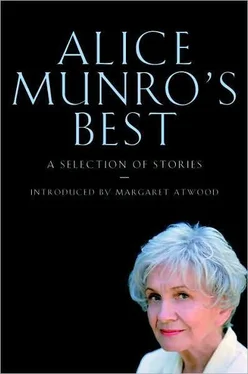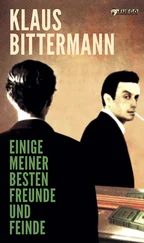He told me how he found my mother on the couch in the kitchen when he came in at noon. She had picked a few tomatoes, and was setting them on the windowsill to ripen; then she must have felt weak, and lain down. Now, telling this, his voice went wobbly — meandering, as you would expect — in his amazement. I saw in my mind the couch, the old quilt that protected it, right under the phone.
“So I thought I better call you,” my father said, and he waited for me to say what he should do now.
* * *
MY MOTHER PRAYED on her knees at midday, at night, and first thing in the morning. Every day opened up to her to have God’s will done in it. Every night she totted up what she’d done and said and thought, to see how it squared with Him. That kind of life is dreary, people think, but they’re missing the point. For one thing, such a life can never be boring. And nothing can happen to you that you can’t make use of. Even if you’re wracked by troubles, and sick and poor and ugly, you’ve got your soul to carry through life like a treasure on a platter. Going upstairs to pray after the noon meal, my mother would be full of energy and expectation, seriously smiling.
She was saved at a camp meeting when she was fourteen. That was the same summer that her own mother — my grandmother — died. For a few years, my mother went to meetings with a lot of other people who’d been saved, some who’d been saved over and over again, enthusiastic old sinners. She could tell stories about what went on at those meetings, the singing and hollering and wildness. She told about one old man getting up and shouting, “Come down, O Lord, come down among us now! Come down through the roof and I’ll pay for the shingles!”
She was back to being just an Anglican, a serious one, by the time she got married. She was twenty-five then, and my father was thirty-eight. A tall good-looking couple, good dancers, good cardplayers, sociable. But serious people — that’s how I would try to describe them. Serious the way hardly anybody is anymore. My father was not religious in the way my mother was. He was an Anglican, an Orangeman, a Conservative, because that’s what he had been brought up to be. He was the son who got left on the farm with his parents and took care of them till they died. He met my mother, he waited for her, they married; he thought himself lucky then to have a family to work for. (I have two brothers, and I had a baby sister who died.) I have a feeling that my father never slept with any woman before my mother, and never with her until he married her. And he had to wait, because my mother wouldn’t get married until she had paid back to her own father every cent he had spent on her since her mother died. She had kept track of everything — board, books, clothes — so that she could pay it back. When she married, she had no nest egg, as teachers usually did, no hope chest,sheets, or dishes. My father used to say, with a sombre, joking face, that he had hoped to get a woman with money in the bank. “But you take the money in the bank, you have to take the face that goes with it,” he said, “and sometimes that’s no bargain.”
THE HOUSE WE lived in had big, high rooms, with dark-green blinds on the windows. When the blinds were pulled down against the sun, I used to like to move my head and catch the light flashing through the holes and cracks. Another thing I liked looking at was chimney stains, old or fresh, which I could turn into animals, people’s faces, even distant cities. I told my own two boys about that, and their father, Dan Casey, said, “See, your mom’s folks were so poor, they couldn’t afford TV, so they got these stains on the ceiling — your mom had to watch the stains on the ceiling!” He always liked to kid me about thinking poor was anything great.
WHEN MY FATHER was very old, I figured out that he didn’t mind people doing new sorts of things — for instance, my getting divorced — as much as he minded them having new sorts of reasons for doing them.
Thank God he never had to know about the commune.
“The Lord never intended,” he used to say. Sitting around with the other old men in the Home, in the long, dim porch behind the spirea bushes, he talked about how the Lord never intended for people to tear around the country on motorbikes and snowmobiles. And how the Lord never intended for nurses’ uniforms to be pants. The nurses didn’t mind at all. They called him “Handsome,” and told me he was a real old sweetheart, a real old religious gentleman. They marvelled at his thick black hair, which he kept until he died. They washed and combed it beautifully, wet-waved it with their fingers.
Sometimes, with all their care, he was a little unhappy. He wanted to go home. He worried about the cows, the fences, about who was getting up to light the fire. A few flashes of meanness — very few. Once, he gave me a sneaky, unfriendly look when I went in; he said, “I’m surprised you haven’t worn all the skin off your knees by now.”
I laughed. I said, “What doing? Scrubbing floors?”
“Praying!” he said, in a voice like spitting.
He didn’t know who he was talking to.
I DON’T REMEMBER my mother’s hair being anything but white. My mother went white in her twenties, and never saved any of her young hair, which had been brown. I used to try to get her to tell what color brown.
“Dark.”
“Like Brent, or like Dolly?” Those were two workhorses we had, a team.
“I don’t know. It wasn’t horsehair.”
“Was it like chocolate?”
“Something like.”
“Weren’t you sad when it went white?”
“No. I was glad.”
“Why?”
“I was glad that I wouldn’t have hair anymore that was the same color as my father’s.”
Hatred is always a sin, my mother told me. Remember that. One drop of hatred in your soul will spread and discolor everything like a drop of black ink in white milk. I was struck by that and meant to try it, but knew I shouldn’t waste the milk.
ALL THESE THINGS I remember. All the things I know, or have been told, about people I never even saw. I was named Euphemia, after my mother’s mother. A terrible name, such as nobody has nowadays. At home they called me Phemie, but when I started to work, I called myself Fame. My husband, Dan Casey, called me Fame. Then in the bar of the Shamrock Hotel, years later, after my divorce, when I was going out, a man said to me, “Fame, I’ve been meaning to ask you, just what is it you are famous for?”
“I don’t know,” I told him. “I don’t know, unless it’s for wasting my time talking to jerks like you.”
After that I thought of changing it altogether, to something like Joan, but unless I moved away from here, how could I do that?
IN THE SUMMER of 1947, when I was twelve, I helped my mother paper the downstairs bedroom, the spare room. My mother’s sister, Beryl, was coming to visit us. These two sisters hadn’t seen each other for years. Very soon after their mother died, their father married again. He went to live in Minneapolis, then in Seattle, with his new wife and his younger daughter, Beryl. My mother wouldn’t go with them. She stayed on in the town of Ramsay, where they had been living. She was boarded with a childless couple who had been neighbors. She and Beryl had met only once or twice since they were grown up. Beryl lived in California.
The paper had a design of cornflowers on a white ground. My mother had got it at a reduced price, because it was the end of a lot. This meant we had trouble matching the pattern, and behind the door we had to do some tricky fitting with scraps and strips. This was before the days of pre-pasted wallpaper. We had a trestle table set up in the front room, and we mixed the paste and swept it onto the back of the paper with wide brushes, watching for lumps. We worked with the windows up, screens fitted under them, the front door open, the screen door closed. The country we could see through the mesh of screens and the wavery old window glass was all hot and flowering — milkweed and wild carrot in the pastures, mustard rampaging in the clover, some fields creamy with the buckwheat people grew then. My mother sang. She sang a song she said her own mother used to sing when she and Beryl were little girls.
Читать дальше












